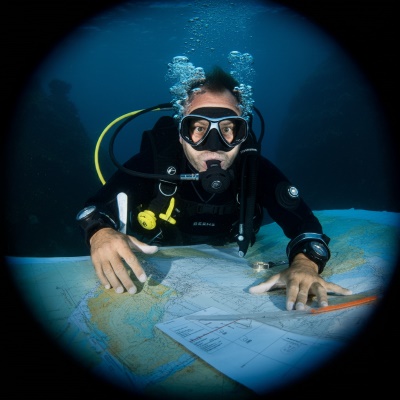
Picture this: you're excitedly exploring a shipwreck in a Midwest lake, marveling at the ghostly silhouette against the hazy backdrop. You turn around to point out a cool artifact to your buddy, but wait... where'd they go? You scan the murky water, heart pounding, and realize you've managed to lose your dive partner in a cloud of silt. Not exactly the kind of underwater hide-and-seek you signed up for, right?
Okay, maybe it's not always that dramatic, but getting disoriented or lost underwater is a real concern, especially in the Midwest, where visibility can be less than ideal. That's why mastering underwater navigation skills is crucial for every diver, from newbies to seasoned pros. It's not just about finding your way back to the boat – it's about exploring confidently, maximizing your bottom time, and avoiding those "oops" moments that can turn a fun dive into a stressful one.
So, grab your compass, dust off your mental map, and let's navigate the murky waters of underwater navigation together!
The Basics: Building Your Underwater Navigation Toolkit
Even if you're not planning on becoming the next Jacques Cousteau, a few basic navigation skills can go a long way in enhancing your diving experience.
- Compass: Your trusty underwater guide. A dive compass is like a miniature North Star, helping you maintain a heading and navigate to specific points. Learn how to set and follow a bearing, and practice using your compass in a pool or confined water environment before venturing out into the open water.
- Natural Navigation: Even without a compass, you can use natural features to orient yourself underwater. Pay attention to bottom contours, the direction of sunlight, and any distinctive landmarks like rock formations or submerged trees.
- Kick Cycles: Counting your kick cycles can help you estimate distances underwater. Practice in a pool to determine your average kick cycle distance, and then use that information to navigate between points on your dive.
- Dive Planning: Before every dive, create a plan with your buddy that includes your intended route, depth, and time. Discuss hand signals and other communication methods to ensure you can stay connected and navigate together.
Midwest Challenges: Navigating Murky Waters and Limited Visibility
Midwest diving can be a bit like navigating a cornfield in a fog – visibility can be limited, and landmarks might be few and far between. But don't worry, with a few adjustments to your navigation techniques, you can still explore confidently:
- Low Visibility: When the water's murky, it's crucial to stay close to your buddy and maintain physical contact. You can also use a line or reel to navigate between points or explore a wreck or cave. Focus on the bottom contours and your depth gauge to avoid getting disoriented.
- Currents and Surge: Midwest waters can experience strong currents and surge, especially in rivers and near shore. Before your dive, assess the conditions and plan your route accordingly. Learn how to use currents to your advantage, and be prepared to adjust your course if needed.
- Limited Landmarks: In some areas, there might not be many distinctive features to use for navigation. In these cases, rely on your compass and kick cycle counts to stay on track.
Advanced Navigation Techniques: Level Up Your Skills
Ready to take your navigation skills to the next level? Consider these advanced techniques:
- Underwater Maps and Charts: Familiarize yourself with underwater maps and charts of your dive site. These can help you plan your route, identify points of interest, and navigate more efficiently.
- Navigation Patterns: Learn different search patterns, such as the U-pattern or expanding square, to systematically explore an area and increase your chances of finding specific objects or dive sites.
- Natural Navigation Mastery: Fine-tune your natural navigation skills by paying close attention to subtle clues like the sun's position, ripple patterns on the surface, and even the behavior of fish.
Dive Right In Scuba: Your Navigation Gurus
At Dive Right In Scuba, we're passionate about helping you become a confident and skilled navigator. Our experienced instructors offer navigation-specific courses and workshops to help you master these essential skills. We also have a wealth of knowledge about local dive sites and conditions, so don't hesitate to ask for advice or recommendations.
Don't Get Lost in the Current: Master Your Navigation Skills
Underwater navigation is both an art and a science, and it's a skill that every diver should strive to master. Whether you're exploring a shipwreck in the Great Lakes or navigating a coral reef in the Caribbean, the ability to find your way underwater is crucial for safety and enjoyment.
So, grab your compass, trust your instincts, and don't be afraid to ask for help. With practice and the right guidance, you'll be navigating the underwater world like a pro in no time!
Remember, the best dive is the one you come back from safely, with a smile on your face and a story to tell. Happy navigating!
